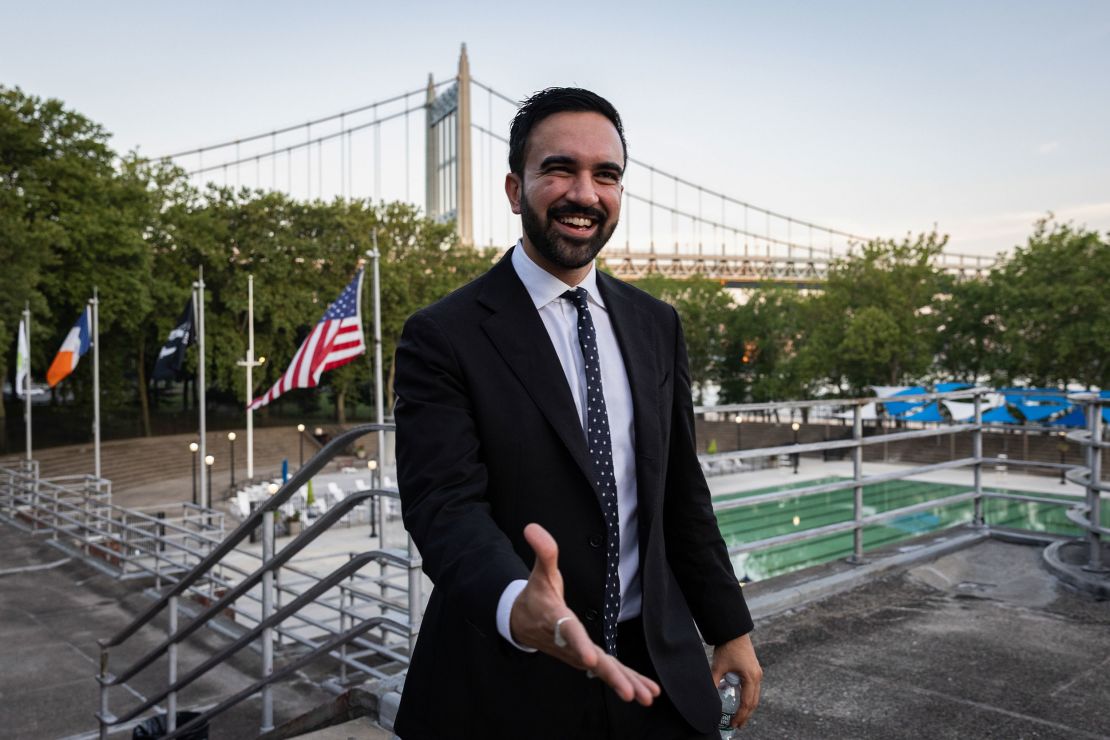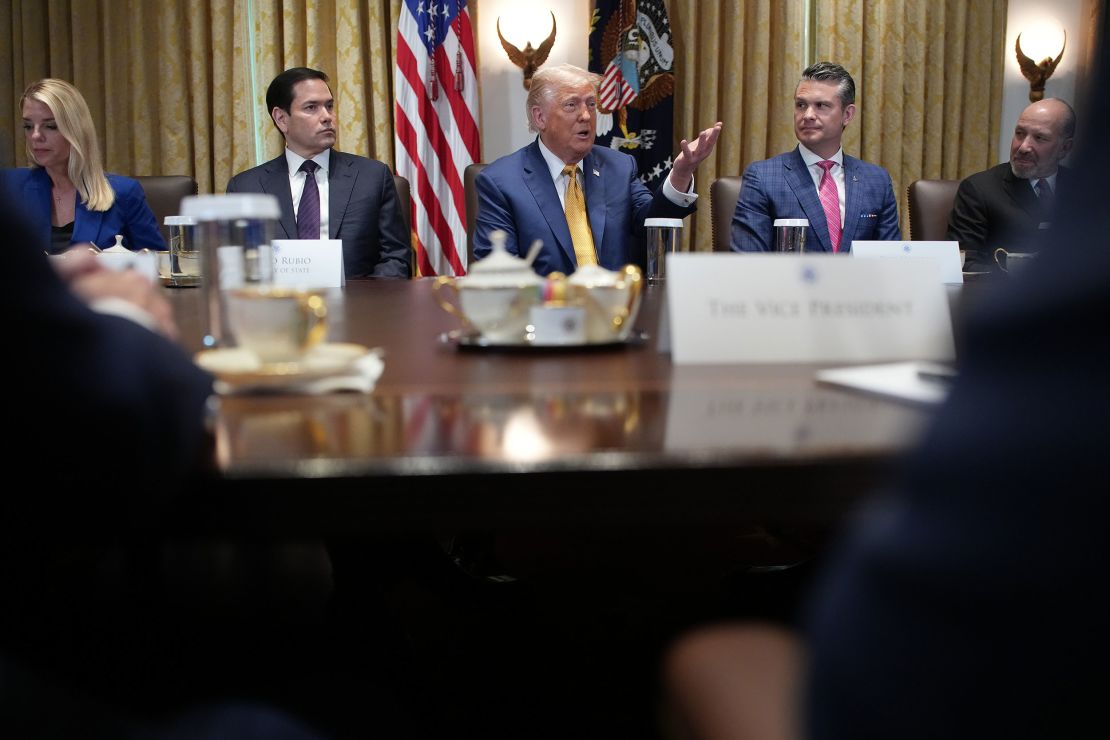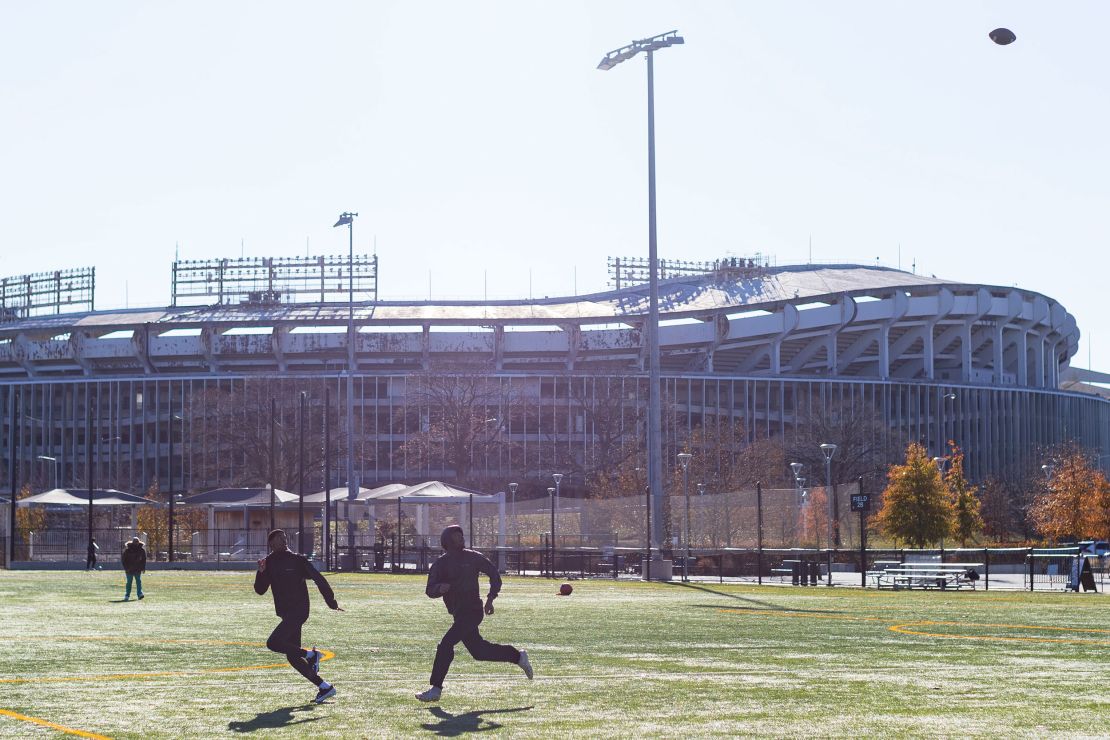CNN
—
President Donald Trump issued a provocative threat during a Cabinet meeting this week: If New York City elects a “communist” mayor, he might take the city over, just like he might take over Washington, DC.
“We have tremendous power at the White House to run places when we have to,” he said.
He was referring to the rise of Zohran Mamdani, the Democratic nominee in New York’s upcoming mayoral race. Mamdani is not a communist, but rather a democratic socialist in the vein of Sen. Bernie Sanders and Rep. Alexandria Ocasio-Cortez.
The president clearly sees the would-be mayor as an A-list political enemy he’ll use to argue the Democratic Party has been overtaken by the “radical left.” His increasing use of the word “communist” harks back to the ugliness of the Red Scare.
Trump also trotted out some profanity in the Cabinet Room of the White House when he referred to Mamdani as “a man who’s not very capable, in my opinion, other than he’s got a good line of bullsh*t.”
It’s the latest in a string of increasingly charged accusations Trump has made, including that Mamdani, who is a naturalized citizen, might be in the US illegally, something for which there is no evidence. That kind of attack will sound familiar to anyone who remembers Trump’s incessant and false questioning of President Barack Obama’s birth certificate.

But the idea that Trump might try to “run” New York if Mamdani wins is something else — a warning to New York voters and a new threat to expand presidential power. Does that mean starving the city of federal funds or something more drastic?
It would also be pretty clearly unconstitutional for him to try to “run” the city, according to Elizabeth Goitein, an expert on presidential power at the Brennan Center for Justice.
When I asked her what presidential authority would allow him to do so, her answer was short.
“Not run a city,” she said, pointing to the 10th Amendment, which gives powers not enumerated in the Constitution back to the states.
“There’s no emergency power that allows the president to take over a city,” she said, and particularly not in retaliation for electing a mayor the president disagrees with.
He has tested the Constitution repeatedly during his second term — trying to reinterpret the 14th Amendment and birthright citizenship and reimagine the federal bureaucracy without passing any laws.
But Goitein pointed to key decisions, including a rejection of Trump’s attempt to use the Alien Enemies Act to more swiftly deport people without due process, to argue the courts remain a meaningful check on the administration.
Trump’s advisers, CNN has reported, considered using the Insurrection Act, another antiquated law from the early days of the republic, to broadly use federal troops for law enforcement in Los Angeles to help federal deportation agents. Instead, they ended up citing more recent law that allows the federal government to take control of a state’s National Guard, for which California is now suing the administration.
Goitein said the deployment of troops to Little Rock, Arkansas, by the Eisenhower administration was in the service of a Supreme Court Order.
“That’s very different from a city electing a mayor with whose policies the president opposes,” she said.
Martial law was declared in Hawaii during World War II, she said, but it was authorized by a law that no longer exists.
Trump also referred at the White House to the possibility that he could also take over Washington, DC, something that he has been talking about for years. There’s clear precedent for the federal government being in charge of the nation’s capital.

It’s in the Constitution, after all, something that has always complicated efforts by progressives and Democrats to grant statehood to DC.
But Congress ceded self-governance to district residents back in 1973, with a law signed by President Richard Nixon, who described himself as “a longtime supporter of self-government for the District of Columbia.”
The CNN presidential historian Tim Naftali, a former director of the Nixon Presidential Library, told me Nixon did take the idea of self-governance seriously, including for DC residents.
Trump has described DC today as “a nightmare of murder and crime,” but back then it was literally reeling and still rebuilding after riots destroyed city blocks following the assassination of Martin Luther King Jr. in 1968.
Naftali pointed out that Nixon was close with the city’s mayor, Walter Washington, who advocated for the construction of the Metro subway system and installed the city’s first public defender.
“Nixon’s view of the District of Columbia was that the residents of the district could best govern themselves,” Naftali told me. “I do not believe that is Donald Trump’s view at all.”
The law Nixon signed allowed Washingtonians to vote for their first-ever popularly elected mayor in 1974. Conservatives in Congress today want to take that power back and have introduced a bill, the “BOWSER Act” (so named to troll DC Mayor Muriel Bowser), to repeal DC’s home rule and put the city more under federal control.
Trump aligns with Bowser on one key DC issue: the reconstruction of RFK stadium as a home for the Washington Commanders, although the proposal is currently stalled before DC’s city council.
He promised to “renovate it, and rebuild our capital city,” but so far that has included the issuance of an executive order and creation of a committee focused on surging police into the streets and creating a beautification plan.
Trump said his chief of staff, Susie Wiles, has been working with DC’s mayor. And Bowser has been notably uncritical of the Trump administration in his second term.

Domingo Morel is an associate professor of political science and public service at New York University who has written about the ugly history of states taking over things like school boards or imposing their will on cities, frequently those with large Black and minority populations, and taking power from the local populations.
Trump is implying something similar here, Morel told me.
“He’s saying to New Yorkers, 5 million or so registered voters, ‘Whatever you say doesn’t matter; we’re going to take away your ability to govern because we don’t like the way you have decided to vote.’”
That’s assuming Mamdani wins, which is a big assumption, given the fact that current Mayor Eric Adams and former Gov. Andrew Cuomo will both be on the ballot on Election Day. Meanwhile, former New Yorker Trump will be chiming in with vague threats.

